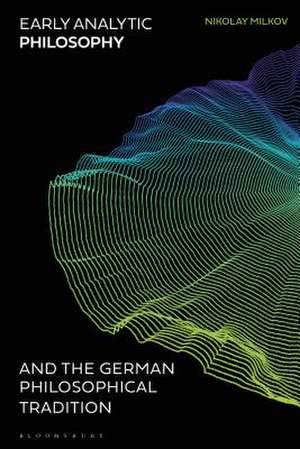Early Analytic Philosophy and the German Philosophical Tradition
Autor Dr Nikolay Milkoven Limba Engleză Hardback – 19 feb 2020
| Toate formatele și edițiile | Preț | Express |
|---|---|---|
| Paperback (1) | 219.01 lei 6-8 săpt. | |
| Bloomsbury Publishing – 25 aug 2021 | 219.01 lei 6-8 săpt. | |
| Hardback (1) | 599.82 lei 6-8 săpt. | |
| Bloomsbury Publishing – 19 feb 2020 | 599.82 lei 6-8 săpt. |
Preț: 599.82 lei
Preț vechi: 859.39 lei
-30% Nou
Puncte Express: 900
Preț estimativ în valută:
114.77€ • 119.83$ • 94.99£
114.77€ • 119.83$ • 94.99£
Carte tipărită la comandă
Livrare economică 04-18 aprilie
Preluare comenzi: 021 569.72.76
Specificații
ISBN-13: 9781350086432
ISBN-10: 1350086436
Pagini: 296
Dimensiuni: 156 x 234 mm
Greutate: 0.6 kg
Editura: Bloomsbury Publishing
Colecția Bloomsbury Academic
Locul publicării:London, United Kingdom
ISBN-10: 1350086436
Pagini: 296
Dimensiuni: 156 x 234 mm
Greutate: 0.6 kg
Editura: Bloomsbury Publishing
Colecția Bloomsbury Academic
Locul publicării:London, United Kingdom
Caracteristici
Explores the work of major philosophers including Kant, Hegel, Brentano, Frege, Leibniz, Lotze, Husserl, Moore, Russell and Wittgenstein
Notă biografică
Nikolay Milkov is Professor of Philosophy at University of Paderborn, Germany.
Cuprins
Preface Part I: Introductory chaptersChapter 1: What is early analytic philosophy and how to write its history?Chapter 2: What is logical history of philosophy? Part II: Leibniz and HegelChapter 3: Leibniz's project for characteristica universalis and the early analytic philosophyChapter 4: Making sense of Hegel with the help of early analytic philosophyChapter 5: Frege and the German philosophical idealism Part III: Hermann LotzeChapter 6: Lotze and the Cambridge analytic philosophyChapter 7: Russell's debt to LotzeChapter 8: Lotze's concept of states of affairs Part IV: Edmund HusserlChapter 9: Edmund Husserl and Bertrand Russell, 1905-1918 Chapter 10: Husserl's theory of manifolds in relation to Russell and WittgensteinChapter 11: Wittgenstein's indefinables and his phenomenology Part V: Two neglected German proto-analytic philosophersChapter 12: G. E. Moore and Johannes Rehmke Chapter 13: Leonard Nelson, Karl Popper, and early analytic philosophy Part VI: Different conceptions of analytic philosophy Chapter 14: Wittgenstein and the Vienna Circle, vs. Moore and Russell Chapter 15: Two concepts of early analytic philosophyChapter 16: What is analytic philosophy? References Index
Recenzii
This work is an amazing achievement in scope, originality, depth, and in discoveries of new and important strands in the history of philosophy. It will transform our understanding of Frege, Russell, Moore, Wittgenstein, Carnap and of their relations to their German predecessors and contemporaries.
